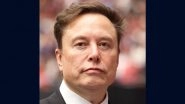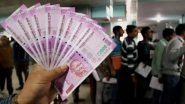New Delhi [India], March 21 (ANI/PNN): A gem for the brands and marketing ecosystem, Market Xcel, a leading market research and insights firm, launched the second edition of their much-awaited brand ranking report amidst the presence of eminent industry stakeholders such as Jayen Mehta, I/C Managing Director Amul and Sameep Shastri, Indian Institute of Governance & Leadership, Co-Founder & President - Confederation of Young Leaders, Vice Chairman - BRICS Chamber of Commerce & Industry on 17th March at the Brand Xcel Conclave in Oberoi Gurgaon.
The report is the culmination of months of research and analysis, offering a deeper consumer connection and understanding of 20,000 respondents across the length and breadth of the country, including Rural India. The study highlights refreshed aspects and insights from the brand ranking that can be circled back to consumer behavior. It further deliberates on the factors that enabled the marketplace to function during the pandemic and allowed brands to sustain their relationship with consumers.
Also Read | Spring Season 2023: Funny Memes, Hilarious Jokes Go Viral As Netizens Welcome First Day of Spring.
In the top 50 brands' ranking, brands like Amul, Jio, Colgate, Oppo, Vivo, YouTube, Godrej, Dabur, Nestle, Dettol, Lux, LG, Samsung, Tata Salt and more emerged in both urban and rural through the pecking order is different. Jio emerged as the top telecom brand in rural areas, whereas Samsung emerged as the leading mobile phone brand in urban areas.
Brand Xcel report 2023 decoded and highlighted top regional brands across India, revealing consumers' increasing preference for regional and local tastes. The survey covered all four zones in India, including north, south, east and west. The demand for regional flavors is rising, and consumers are shifting their purchasing behavior towards local indulgences. It gives brands the opportunity to explore local flavors and win over consumers.
It is discovered that Food (CPG) in the TOP 50 has an equal share across urban and rural, thereby indicating similar relevance to last year. Whereas in the Top 10, there's a different phenomenon considering the same category, with an evident domination of 4 brands in the rural and 1 in the urban.
In the Top 50, compared to urban, there is a citation of 6 Personal care brands and 8 brands in Household appliances in the hinterlands, with 2 and 4 in urban, respectively. However, Automobiles have maintained a static position, with 4 brands emerging last year and this year as well in both areas indicating no change. Moving on, Mobile phones have also undergone a slight rise with the emergence of 4 to 5 brands in urban.
Considering the top 50 and top 10 brands, there's less relevance of mobile phones in rural in comparative terms. If we compare this year's E-commerce brands' relevance in the urban to the previous year, we notice a dip. However, in the Top 10, there's a slight rise. Among the Top 50 brands, social media in urban has risen from 3 brands in the last year to 5 brands in the current year, with comparatively less relevance in the rural. However, there's an opposite scenario when we consider the Top 10 brands, as there is more relevance of social media in the rural than the urban.
Amid the "new normal," connectivity has become the top priority for consumers in both rural and urban areas. The review of the findings discloses the inclination of urban consumers towards the need to connect better, with an average score of 6.5 and the dominance of telecom brands like Jio & Airtel in the top 10, whereas in the rural the need for connecting had an average score of 11.9 with the prominence of telecom and mobile phone brands like Jio and Airtel among the top 10.
Reflecting a stark contrast between urban and rural brands with respect to food and shelter, while the need driver for eating better has an average rank of 13.6 among the hinterlands with the emergence of brands like Amul, Dabur, Nestle, Patanjali and among urban consumer the ranking came to 25.8, reflective of the fact that the need to eat more and better has higher relevance in rural domain. Going beyond the needs of connectivity, the needs of the urban consumers revolve around the need for living better with a score of 18.4, much higher with the emergence of brands like Samsung, LG, Amazon, Maruti, Paytm etc., than rural at 34.1 with the emergence of brands like Bajaj, Hero, Honda, Havells, Usha, LG, Samsung.
The storm riders and the unicorns, as validated by the Indian Consumers that have maintained agility and resilience across urban, semi-urban and rural are Meesho, PhonePe, Nykaa, and Dream 11. While BlinkIt emerged as the no. 1 startup in urban, Meesho topped the startups' list in tier II and tier III cities. Other startups that made it to the top 10 list were Urban Company, BluSmart, CRED, Licious and more.
Brands in the areas of food, personal care, mobile phones, and social media have proven to be resilient and have remained highly relevant to consumers. These brands have established numerous touchpoints in consumers' daily lives.
Further, Colgate tops personal care; Amul tops Food (CPG); Maruti Tops Automotive (4-wheeler); Pepsico tops Beverages; Parachute Advanced tops Haircare; Amazon tops e-commerce; Lakme tops cosmetics; Disney Hotstar tops OTT; Surf tops Homecare/Laundry; Samsung tops IT & electronics, Mobile phones, and Household Appliances & Kitchen Ware; Haldirams tops Restaurants/Fast Food Joints/Coffee shops/QSR among others.
Certain unique brands like Bharat gas, Relaxo, Ghari, Santoor and more emerged specifically from the rural choices, whereas brands like Amazon, Twitter, Surf, and Closeup were unique to the urban consumers.
The major trends that emerge out of the report are shades of sustainability as the key ingredients, the democratisation of the internet, the dominance of digital-first and more. The report also demonstrates the changing cohort preferences and how the golden agers are preaching the digital way of life, whereas Gen Z and millennials are seen driving social and ethical changes. Smashing the gender stereotypes, while the men have entered the domains of household chores and embracing grooming, women are more empowered in influencing major financial decisions.
For a long time, brands and businesses have relied on traditional communication methods to engage with their customers. However, with the rise of social media and the changing expectations of consumers, this approach is majorly shifting from communication to conversation. By embracing the conversational approach, brands and businesses can create deeper connections with their customers, better understand their needs and preferences, and ultimately drive greater loyalty and advocacy. It's about the authentic art of storytelling. In disruptive times like today, building a strong brand gravity is imperative, and the future of competition certainly lies with who generates the most brand gravity. As reflected in the findings, reviews and ratings strongly decide the fate of a brand, as customers rely heavily on what users feel about that very product. People believe in people and not promotions.
Talking about the blurring of lines between the urban and rural, the modern hinterlands have emerged as stones of resilience in the new moral. There is no doubt that the pandemic has pushed the rural economy further towards a massive technology upgradation phase, with electronic items becoming essential commodities and mobile phones becoming household necessities for education and other diverse purposes. Not only has rural India come at par with its urban counterparts with respect to aspirations and entertainment preferences, but it has also beaten urban in terms of FMCG growth. What is even more interesting is the way the average rural consumer has embraced packaged products. Where once upon a time, a rural consumer preferred to buy loose grocery options in rural India or even a tier-III or IV towns, due to the pandemic and the transition towards packaged foods, snack foods like biscuits and namkeen are major items of purchase reflecting higher shelf-life indulgences.
The Brand Xcel Conclave, as hosted by Market Xcel, gathered the top marketing minds from the industry, like Lloyd Mathias, Rajiv Inamdar, Jitender Dabas, Mohan Krishnan, Mohit Hajela and Jayen Mehta, and many other others. Major leading brands like Jaquar, Dabur, Nestle, Honda-2 wheeler, Maruti, Jio, LG, BharatPe, Patanjali, Vivo, Oppo, Haldiram, Santoor/Wipro and top startups like Urban Company, BluSmart and more marked their presence at the event and were felicitated for commandability.
Sharing his thoughts on the emerging trends from the report, Lloyd Mathias, Brand Consultant and Angel investor, stated, "Amidst the changing landscape if we dig deeper into what's happening in the larger ecosystem, there are massive disruptions emerging. The key drivers of the disruption are the Democratisation of the Internet, Easier access to capital, Business Model Innovation, Millennials and Gen Z taking centre stage of the changing consumers and, India's huge digital stack".
Ashwani Arora, Executive Director, Market Xcel, shared, "The assessment of brand ranking delivers an understanding of the changing codes of consumer behaviours in the post-pandemic era and what they manifest for the brands. Based on the study, it derives categories that have a profound impact on the life of Indian consumers both in urban and rural. The book comprises 4 pillars, blurring lines of rural and urban, Brand relevance in both worlds, the trends that have stayed vs those that have transitioned, and the new-age vs the rooted brands. Through our study, marketers can thus be better informed on the portrayal of what matters to consumers today".
Extending his gratitude for being a part of the Brand Xcel 2023 Conclave, Jayen Mehta, I/C Managing Director, Amul stated, "It's more of an academic and educational experience for me to be here with Market Xcel and learn about whatever they have been doing for years. Happy to be here today. Our conversations with consumers and the brands they consume are very dynamic, and the effort for this year is very interesting with a very interesting focus on marketers, how we look at the future, how we look at the brands and products both as manufacturers, producers, sellers and focus on increased engagement with consumers".
Sameep Shastri, Vice Chairman of the BRICS Chamber of Commerce & Industry, added, "It's the era of marketing and Market Xcel with decades of work experience, range of services and satisfying customers, is at the forefront of reshaping the marketing space. They are going beyond everything, and it has been a privilege to connect with the entire team and be part of this journey".
Sharing his experience, Jitender Dabas, Chief Operating Officer & CSO, McCann Worldgroup India, added, "I am grateful to the Market Xcel team for inviting me to be part of the Brand Xcel journey. The Brand Xcel report offers a lot of perspective on urban-rural, a lot about women empowerment, a lot about inclusion and about more power to brands today."
To know more, download the report today: https://forms.gle/JVp4WPpah3zkiCj76
This story is provided by PNN. ANI will not be responsible in any way for the content of this article. (ANI/PNN)
(The above story is verified and authored by ANI staff, ANI is South Asia's leading multimedia news agency with over 100 bureaus in India, South Asia and across the globe. ANI brings the latest news on Politics and Current Affairs in India & around the World, Sports, Health, Fitness, Entertainment, & News. The views appearing in the above post do not reflect the opinions of LatestLY)













 Quickly
Quickly


